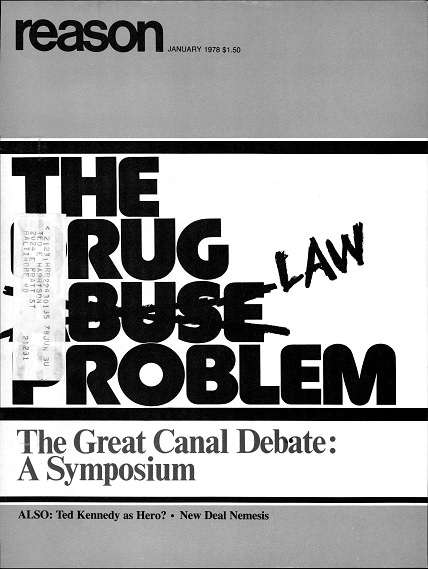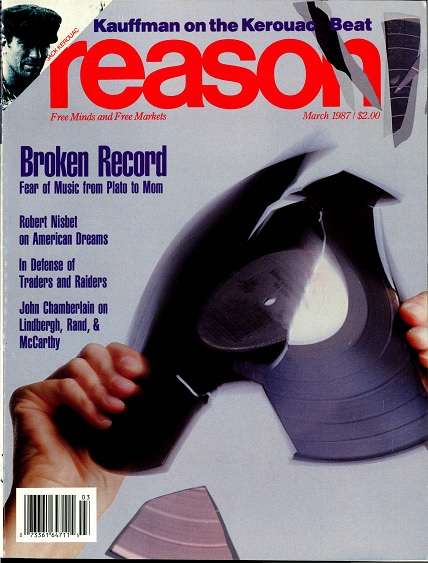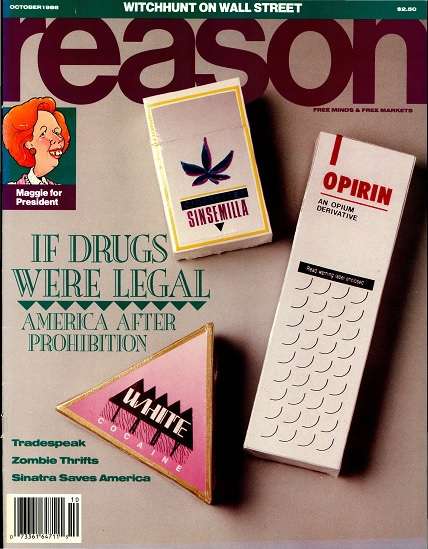Reason's Best Marijuana Content (That We Can Remember)
The first issue of Reason magazine came out in 1968, so Reason is older than the War on Drugs kicked off by Richard Nixon in 1971. As this month's drug war-themed issue illustrates, the movement to end drug prohibition has some serious momentum. A look through our archives, however, shows that America's slide into an environment where government restrictions on the right to use certain substances started long before Nixon's "drug war" and it's been a long slog out of that often too deadly pattern.
In the January 1978 issue of Reason, whose cover touted "The Drug Abuse Law Problem," psychiatry professor and Reason contributing editor Thomas Szasz pointed to 1914 as the end of when Americans "regarded freedom of choosing their diets and drugs as fundamental rights." What had happened since the government first began to meddle in the regulation of food and drugs, according to Szasz, was the creation of a "therapeutic state," where there was no separation of Medicine and State, a condition that couldn't have been predicted by the founding fathers. "The very idea that the government should lend its police power to physicians to deprive people of their free choice to ingest certain substances would have seemed absurd to the drafters of the Bill of Rights," Szasz wrote, comparing contemporary America's relationship with official medicine to medieval Spain's relationship with the Catholic Church and the Inquisition it produced.

That issue also included a report from Sheldon Richman on New York Governor Nelson "Rockefeller's Draconian Drug Law," which had brought the state of New York, since its enactment in 1973, 2,000 life sentences and "more drugs and more addicts than ever before." Rockefeller, a Republican, had pushed through some of the strictest laws in the country on the possession and use of narcotics to burnish his credentials in an attempt to run for president. Critics ranging from the American Civil Liberties Union to the Conservative Party lobbied against the law, to no avail. Rockefeller dismissed their concerns as misguided, and said it wouldn't stop him from trying to "protect the people." As Richman reported, "most of the critics' predictions about the law have come true."

In the March 1987 issue, Roy Childs reviewed the 1,000-plus page tome The Underground Empire by James Mills, which followed the since disbanded CENTAC, a tactical unit within the Drug Enforcement Administration (DEA). The book details the alleged collusion between drug traffickers and government officials as it takes a thrill ride around the black market world of drugs. Tellingly, the reviewer points out, Mills doesn't use the term "prohibition" a single time nor draws any parallels with America's failed attempt at alcohol prohibition and its motivation of organized crime. Neither Mills nor his critics, Childs writes, bother to ask the question of why a black market in drugs exists in the first place. "The paradox is that the more energy and resources governments squander in trying to stop the flow of drugs, the more lucrative drug dealing becomes," he writes.
Seven years later, in the July 1994 issue of Reason, Jacob Sullum identified a possible turning point for the anti-prohibition movement. That year, the mayor of Baltimore told a gathering of mayors and police chiefs that the drug war had failed, while Ethan Nadelmann, then a young Princeton professor, argued against prohibition in an issue of Foreign Policy magazine, attracting a lot of media attention to himself as a voice of reform. " In Nadelmann the drug legalization cause has found a spokesman who is thoughtful, personable, and quick on his feet, wrote Sullum. "As a centrist, an expert on international law enforcement, and an assistant professor at Princeton's Woodrow Wilson School of Public and International Affairs, he has helped bring credibility to a viewpoint long associated with hippies and wild-eyed libertarians."

A year after that, in the July 1995 issue, Sullum reported on a DEA manual on how to argue for prohibition entitled How to Hold Your Own in a Drug Legalization Debate. The manual called arguing against legalization a "long and difficult effort," perhaps foreshadowing that the then-current move toward decriminalization in some jurisdictions would eventually lead to the kind of legalization the U.S. is seeing in Colorado and Washington. Certainly the rhetorical bankruptcy exhibited by prohibitionists was not a good sign for their continued success in imposing the drug war on America.
Today, anti-prohibitionism is making gains in nearly every state of the Union. Earlier this year at Reason.com, John Ross broke down the status of marijuana legalization efforts in every state in the country. In April, we followed up on a 1988 cover story "If Drugs Were Legal."
Sound and Vision
Reason TV launched in October 2007 and our second video, hosted by Drew Carey (who came up with the idea of Reason TV in the first place), was about medical marijuana and the need to reclassify pot under federal drug laws.
Watch the video below and go here for full writeup and links to other resources.
In 2010, Reason TV released "3 Reasons to Legalize Pot Now!" Among the arguments?
1. The tax revenue and savings in law enforcement costs. A 2005 cost-benefit analysis done by Harvard economist Jeffrey Miron found that legalizing marijuana and taxing it similar to alcohol would generate over $6 billion in new revenue and save nearly $8 billion in direct law enforcement costs. Pot is already the biggest cash crop in many states; bringing it into the open market would pump all sorts of energy into the economy.
2. It's going to happen anyway, so why delay the inevitable? Increasing numbers of Americans realize that pot prohibition is an ineffective and costly policy. A 2009 poll by Zogby found that 52 percent of Americans agreed that marijuana should be taxed and regulated like booze. A Field Poll last year of California residents, who will vote on a legalization ballot initiative in the fall, found that 56 percent wanted legalization. Other polls show historically high percentages favoring legalization. In a world of busted budgets, it's crystal clear that spending time and energy policing marijuana is not worth it.
3. Keep Your Laws Off Our Bodies. Never mind that by virtually every measure, pot is safer and less than disruptive than booze. Pot prohibition in the 1930s was the result of hysteria, not serious threats to society. We own our bodies and should be free to eat, drink, and smoke what we want. And to take responsibility for our actions, whether we're straight or we're stoned.
Watch the video below or go here for the original page with text, links, and more.
When it comes to sheer outrage related to law enforcement and marijuana, there's no shortage of stories that will make your blood pressure spike dangerously high.
Reason TV has covered many of them, including the tawdry, disgusting tale of how cops in Riverside County, California tricked an autistic high school student named Jesse Snodgrass into buying pot and then arrested him.
"This has been devastating to our family. It's a real drain on our resources emotionally, financially, physically," says [father] Doug Snodgrass. "It's exhausting, but when your child gets harmed like this, you really don't think twice about it. It's not a matter of getting even. He is messed up by this and what happened is wrong. We feel an obligation to restore him in every way possible."
Their son was the only arrestee to be reinstated in school, largely thanks to his parents' perseverance and their financial ability to take their fight to court. The other special needs students arrested remained expelled and at least one served a year in jail.
Our documentary, pruduced by Amanda Winkler, was released last fall. In February of this year, Rolling Stone followed up with a widely read feature story on Snodgrass' entrapment that drew more attention to the despicable nature of the police operation.
Here's Reason TV's documentary. Full text and links is online here.
As the prospects for broader legalization get brighter, Reason TV has been talking with some of the most outspoken advocates for an end to the war on pot.
In 2012, Reason TV's Tracy Oppenheimer talked with investigative journalist Doug Fine whose book Too High to Fail looked at all the ways that legalized pot and hemp could, in his words, "revolutionize" the American economy.
For a longer writeup and links, go here.
In a sign of the less-repressed times, earlier this year Reason TV's Paul Detrick traveled to Washington to interview a former Drug Enformcement Administration agent who is now working for Privateer Holdings, a venture-capital fund that invests in marijuana startups.
"The more law enforcement officers acknowledge that prohibition [of marijuana] is wrong, the better off society is going to be," said [Doug] Moen. At the DEA he specialized in wiretaps and worked on cases varying from busting heroin and methamphetamine rings to rooting out pot and painkiller dealers. "Taking that first step is often the most difficult one, it just so happened that I was the one to take it."
The full interview, with text and links, is online here. Or watch below:
For a full list of Reason TV videos related to marijuana, go here.


Show Comments (31)